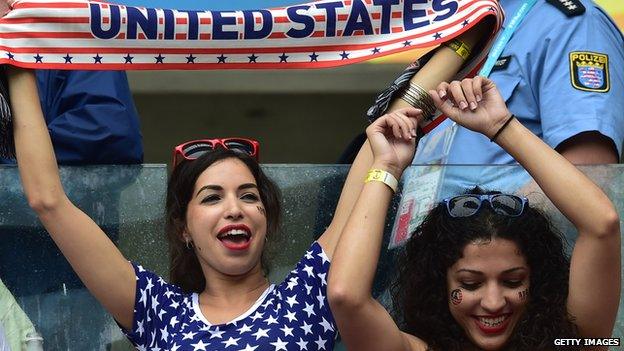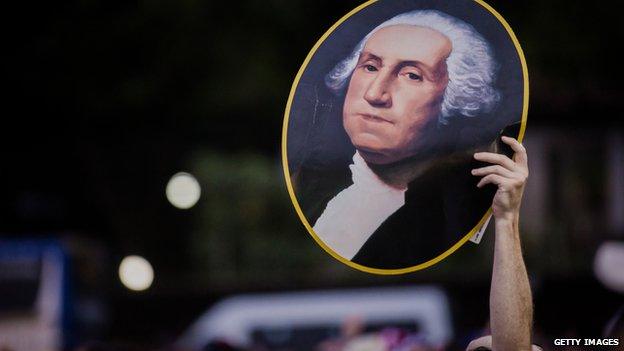Why USA fans are relentlessly upbeat
- Published
US fans chant "I believe that we will win" at the match against Germany
"I believe that we will win!" has become the anthem of the World Cup for USA fans, as their team survived the so-called Group of Death and marched into the last 16 against the odds. But is their relentless positivity antithetical to the culture of football fandom?
It was a sight familiar to any true football fan. As the minutes ticked by in the USA-Germany World Cup match, supporters in Washington DC who had come to watch the game in Dupont Circle became quiet.
Then they groaned as Germany repeatedly gained possession. And they gasped with horror when they went one goal down.
But asked how they felt about the team's chances and the answer stayed the same, no matter what was happening on the pitch - we will win.
In contrast to the positivity of American fans, the English fans were this time commonly downbeat about their chances - expectations were moderate this time around. And, sure enough, the England team failed to exceed them, getting knocked out of the tournament in record time.
But even in more successful times, few England fans would ever go into a match against Germany expecting, without any doubt, to win.

We will win, we will win...
Even the US cheer is, well, cheerful.
The chant "I believe that we will win!" - started in 2003 by US Navy American football fans, according to the Washington Post, external - has become the overarching message of the World Cup in the US. It is heard in bars, used in commercials and hash-tagged on Twitter. It has an optimistic ring that's uncommon among football's true believers.
"I like the older European teams, and they would never chant that," says Michael Agovino, author of The Soccer Diaries: An American's 30-Year Pursuit of the International Game. "'I hope that we will play to a draw' - that's what England or Italy might chant."
But hoping for a tie just isn't in the American character.
And the little bit of promise shown by the US team is enough to trigger a full-on US love-fest.
"The fact that we went 40 years without qualifying for the World Cup has made us the underdog - despite the fact that this is our seventh consecutive World Cup," says Dan Courtemanche, executive vice president of communications for Major League Soccer.
"That underdog mentality breeds optimism - it's part of the American ethos that we believe we can accomplish almost anything no matter what the odds are."
And after all, how often does the US get to be the underdog on the world stage?

It's a particularly American contradiction. They love their come-from-behind heroes - like Rocky or the Boston Red Sox, who went 86 years without winning the World Series. But when they do get the chance to compete on the world stage, like at the Olympics, they often dominate the competition, which is another reason to feel good about their chances.
"For most of America, we're optimistic people and we're not comfortable watching sports believing we can't win," says Corey Bennet, a soccer writer for Fusion.
"Until they are enlightened by experience, they are going to be optimistic."

View of longtime USA fan - Jim Wright
As a country, we might believe we can win because we don't know any better. Or we might believe we can win because we actually have a fantastic team and a remarkable coach.
The thing is, ALL Americans identify with strong character and resolve and a bunch of guys that can overcome the odds. That kind of commitment resonates and moves people to look at a non-American sport in a more open minded way.
They see this team personifying truly American characteristics - indomitable spirit, a unified front and a willingness to work harder than anyone else in the tournament has led to such amazing support.

In other words - Americans are too ignorant to know any better. Most US fans don't quite understand the game, or the long history. That makes it easy to hope for the best even when the odds are stacked against you.
"The more you know as a fan, and the more you've been let down, you expect the worst," says Agovino. "A lot of these fans that you're seeing in these public viewing spots, I love their enthusiasm but they haven't been through the hard times yet."
There was one tough moment - when Portugal equalised deep into injury time to rob USA of one of the most famous wins in their history. But many fans may not have realised how close they were to the edge.
Yet, despite Belgium being favourites in this week's game, Agovino believes (to borrow a phrase) that they will win.

Before the Ghana-US match... some fans felt some influential figures were on their side
"I always thought Belgium was overrated, frankly, so now the US can prove me right," he says. "I'll say we pull it out somehow."
Some sophisticated American fans have even found a way to feel good about the prospect of losing.
Were the US team to lose to Argentina in the quarterfinals, says George Quraishi, founder and editor in chief of the soccer magazine Howler, "I would be pretty psyched."
If the American attitude towards soccer can bewilder, if not outright offend, the English fans, maybe the problem isn't that Americans are being too American in their approach to football. Maybe the Brits are being too British.


US enthusiasm v European realism - Franz Strasser, BBC News
After living in California, Jurgen Klinsmann took over as coach for Germany in 2004. When journalists asked about his goal, he said that of course it was to win the World Cup in 2006.
As a German, I recognised the US attitude in that statement. German coaches never say they are aiming for such a high goal. It's always about making the semi-finals and then "anything can happen".
But now that Klinsmann is the US coach, he went all German. A few months ago, he declared that this US team can't win the World Cup. Realistic, yes, but un-American. His remarks show his split personality - and the different approaches to the game.

"I'm not sure that brutality and disappointment is the default mode of being a soccer fan around the world," says Quraishi. "I think it makes a lot of people happy."
He cites a trip to Greece.
"Soccer was the one thing people were hanging on to, to forget that their country was in a giant toilet," he says, though perhaps the mood is more sombre in Athens today, as the Greek team head home.
The question now is whether Americans will stay optimistic about soccer.
"We are a country that likes progressive growth, achievement and progress we can feel. The real test for America is patience - we are not going to win the World Cup next week and we probably won't win it for a few more decades," says Bennett.
That cold dose of reality, though, is unlikely to turn American fans into glass-half-empty English.
Instead, they might just go back to ignoring the beautiful game - at least for another four years.